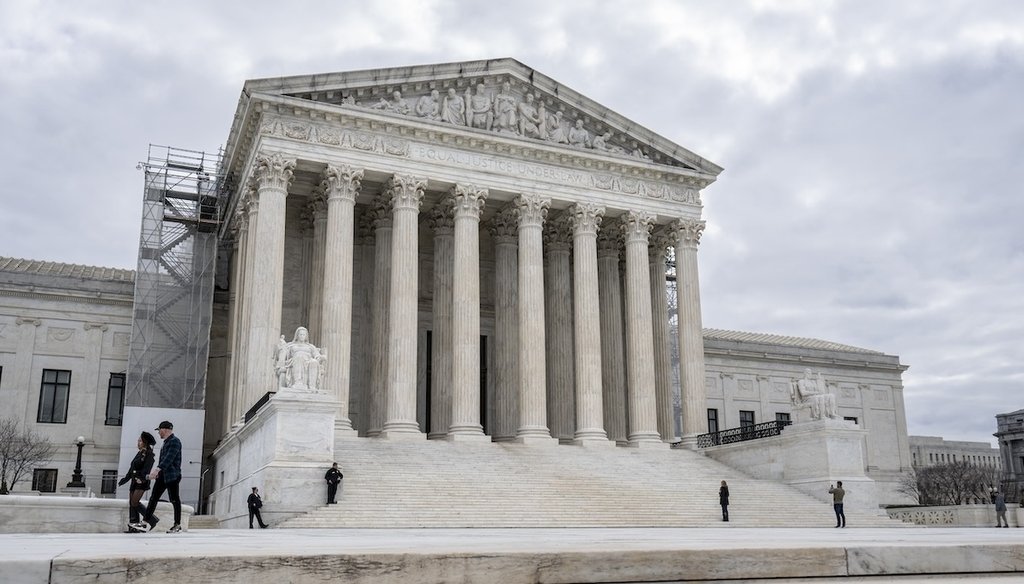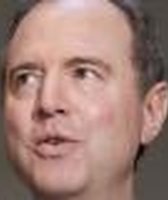Stand up for the facts!
Our only agenda is to publish the truth so you can be an informed participant in democracy.
We need your help.
I would like to contribute

The Supreme Court (AP)
On April 25, former President Donald Trump will get his day in court — the Supreme Court.
That’s when his lawyers will make the case that he should be covered by legal immunity from prosecution. Trump is arguing that Special Counsel Jack Smith cannot prosecute him because presidents are protected from prosecution.
Smith is pursuing two cases against Trump. In one, Trump is accused of retaining and mishandling classified documents after leaving the White House. In the other, Trump is charged with conspiracy and obstruction related to efforts to overturn the 2020 election, which Trump lost.
Smith counters that immunizing Trump from prosecution would essentially put him above the law and enable him to act with impunity.
In their March 19 written brief to the justices, Trump’s lawyers said, "The president cannot function, and the presidency itself cannot retain its vital independence, if the president faces criminal prosecution for official acts once he leaves office."
Sign up for PolitiFact texts
But Smith, arguing at the high court on the government’s behalf, said in his own brief to the justices that Trump seeks "a novel and sweeping immunity from the federal criminal laws that govern all citizens’ conduct."
Legal scholars told PolitiFact they expect the government to prevail on the merits, as has been the case at lower courts.
"I think the prosecution is likely to win, at least to a large extent," said Ilya Somin, a George Mason University law professor. "But the court might carve out some area of immunity."
Ahead of the two sides’ meeting before the justices, here’s an argument-by-argument rundown of each side’s case.
A president would be weakened by being a perpetual target of prosecutors. If the Supreme Court sides with the government and denies presidential immunity, Trump’s lawyers write that it "would incapacitate every future president with de facto blackmail and extortion while in office, and condemn him to years of post-office trauma at the hands of political opponents. The threat of future prosecution and imprisonment would become a political cudgel to influence the most sensitive and controversial presidential decisions, taking away the strength, authority, and decisiveness of the presidency."
There is no historical precedent for prosecuting a president. Trump’s lawyers cite "a 234-year unbroken tradition of not prosecuting former presidents for their official acts, despite ample motive and opportunity to do so."
As evidence, they cite such unprosecuted examples as old as President John Quincy Adams allegedly striking a "corrupt bargain" by appointing Henry Clay as secretary of state after Clay helped deliver the 1824 election to him in the House, and ones as recent as President Bill Clinton’s pardon of financier and campaign donor Marc Rich, President George W. Bush’s use of dubious intelligence to help justify launching the Iraq War and President Barack Obama’s drone strikes that killed civilians overseas.
The absence of prosecutions in cases such as these, they argue, "demonstrates that the newly discovered alleged power (to prosecute) does not exist."
The president is protected by separation of powers. Separation of powers is the legal notion that limits the extent to which one branch of government can insert itself into the affairs of another branch. Trump’s lawyers cite the ruling in the landmark 1803 case Marbury v. Madison, which said partly that a president’s official acts "can never be examinable by the courts."
They also cite the 1982 decision in Nixon v. Fitzgerald. The justices ruled that the president, then Richard Nixon, cannot be held liable in civil cases "for acts within the ‘outer perimeter’ of his official responsibility." The ruling cited the "president's unique office, rooted in the constitutional tradition of separation of powers."
Although Nixon v. Fitzgerald addressed a civil case, instead of criminal prosecutions like the ones Trump is facing, his lawyers argue that it supports the notion that the judicial branch "cannot sit in judgment directly over the president’s official acts."
Impeachment and removal is required before criminal prosecution. Trump’s lawyers argue that prosecution is impossible because the Constitution provides another mechanism: impeachment. As president, Trump survived two impeachment trials, because less than the required two-thirds of senators voted to convict.
The Constitution’s passages on impeachment, Trump’s lawyers argue, reflect "the founders’ understanding that only a president ‘convicted’ by the Senate after impeachment could be criminally prosecuted." In so doing, they argue, the founders "carefully balanced the public interest" of ensuring presidents are held accountable for wrongdoing while guarding against "the mortal danger to our system of government" that "political targeting of the chief executive" could present.
Trump is being targeted individually. Trump’s lawyers argue that the D.C. Circuit Court of Appeals, which ruled in the government’s favor and prompted Trump’s appeal, wrote its ruling so narrowly as to target Trump and the particularities in his case.
They contend that doing so falls short of equal justice, arguing that it creates "the appearance of a gerrymandered ruling tailored to deprive only President Trump of immunity, while leaving all other Presidents untouched."
No person is above the law. Smith’s brief says that the framers never envisioned a president having perpetual immunity from prosecution.
It is "a bedrock principle of our constitutional order" that "no person is above the law — including the president," Smith wrote in the brief. "Nothing in constitutional text, history, precedent, or policy considerations supports the absolute immunity that (Trump) seeks."
Relieving presidents of prosecution could give them a green light to engage in "bribery, murder, treason, and sedition," Smith wrote.
Criminal law is more serious than civil law. Smith argues that Nixon v. Fitzgerald’s focus on civil cases rather than criminal prosecutions undermines its usefulness in making the case for criminal immunity.
"This case involves the far weightier interest in vindicating federal criminal law in a prosecution brought by the executive branch itself," the brief says. "That was not true in Fitzgerald."
The impeachment clause contemplates criminal prosecution. Smith argues that rather than offering an alternative to criminal prosecution, the impeachment process specifically envisions separate criminal prosecutions.
He cites Article I, Section 3 of the Constitution, which says, "Judgment in Cases of Impeachment shall not extend further than to removal from Office, and disqualification to hold and enjoy any Office of honor, Trust or Profit under the United States: but the Party convicted shall nevertheless be liable and subject to Indictment, Trial, Judgment and Punishment, according to Law."
Trump is a former president, not a sitting president. "The framers never endorsed criminal immunity for a former president, and all presidents from the founding to the modern era have known that after leaving office they faced potential criminal liability for official acts," Smith writes.
The smoking gun, he argues, is President Gerald Ford’s pardon of Nixon after he resigned amid the Watergate scandal.
Nixon’s "acceptance of a pardon implied his and President Ford’s recognition that a former president was subject to prosecution," Smith writes.
The lack of prosecutions historically doesn’t mean that prosecutions aren’t valid. "The absence of any prosecutions of former presidents until this case does not reflect the understanding that presidents are immune from criminal liability," Smith writes. "It instead underscores the unprecedented nature of (the) petitioner’s alleged conduct."
Our Sources
Donald Trump, brief to the Supreme Court, March 19, 2024
The United States, brief to the Supreme Court, accessed April 19, 2024
SCOTUSBlog, "Supreme Court to hear Trump’s bid for criminal immunity," April 18, 2024
Oyez, Marbury v. Madison, accessed April 19, 2024
Oyez, Nixon v. Fitzgerald, accessed April 19, 2024
National Archives, the U.S. Constitution, accessed April 19, 2024
Email interview with Frank O. Bowman III, law professor at the University of Missouri, April 19, 2024
Email interview with Brian C. Kalt, law professor at Michigan State University, April 18, 2024
Email interview with Michael J. Gerhardt, law professor at the University of North Carolina, April 18, 2024
Email interview with Ilya Somin, George Mason University law professor, April 20, 2024




















































